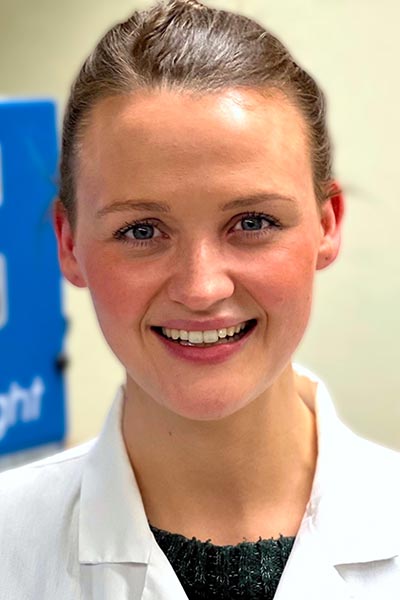Karen Dixon, PhD
Spotlight on the AACR NextGen Stars Class of 2025
Since 2014, the American Association for Cancer Research (AACR) has provided the opportunity for graduate students, postdocs, and assistant professors to give high-profile presentations at the AACR Annual Meeting as part of its NextGen Stars Program. This year, 11 early-career researchers were selected based on their outstanding applications.
Learn more about one of the newest NextGen Stars below, and check out the Q&As with other members of the NextGen Stars Class of 2025.
Karen Dixon, PhD
AACR NextGen Stars Class of 2025
Assistant Professor
University of Basel, Basel, Switzerland
Abstract Presentation:
Dark lipid kinase PI5P4K is a molecular checkpoint of antitumor immunity
Session Details:
SY21 – Immunometabolism and Metabolic Fitness in Tumors
Monday, April 28, 12:30-2 p.m. CT
Room S105, McCormick Place South (Level 1)
What is the subject of your research?
I am trained as an immunologist, so my research over the last decade has centered around broadly understanding the immune system in autoimmunity and cancer. Specifically in cancer, I have been interested in ways to mitigate immune cell dysfunction and sustain durable antitumor immunity in peripheral solid tumors. More recently, I became interested in a dark kinase in the phosphoinositide (PI) pathway that is poorly understood and understudied. Using novel genetic and pharmacological tools, we have found a profound role for PI5P4K𝛾 in regulating antitumor immunity. Specific deletion in immune cells results in the expansion of highly functional antigen-specific T cells. Interestingly, genetic deletion of PI5P4K𝛾 in tumor cells also leads to intrinsic reduction of tumor growth, indicating that targeting PI5P4K𝛾 may have a dual effect—enhancing the immune response in melanoma and curtailing tumor growth directly.
What sparked your interest in this area of research, and why is it important?
My interest was really sparked by the many studies linking the PI system and malignancy with molecules in the phosphoinositide 3 kinase (PI3K) pathway among the most frequently mutated in cancer. Despite the potential of targeting PI3K, development of inhibitors has been hampered by poor drug tolerance and resistance in clinical trials. Much of this work has had a tumor-intrinsic view but the PI pathway plays a very important role in immune cells and there are significant gaps in our understanding of how to target this pathway to boost durable antitumor immunity in a meaningful way. We think we have found a very promising target that not only activates the immune system but also seems to restrain tumor growth in a cancer cell-intrinsic manner, thereby giving a dual effect!
What (or who) inspired you to apply for the NextGen Stars program?
I was really inspired by the previous and current work being conducted by former awardees in this program. It is a tremendous honor to be named among them and I am looking forward to mentoring others to apply in future.
What do you hope to take away from your experience as a NextGen Star and your time at the AACR Annual Meeting 2025?
I am really excited about the opportunity to share my work with the AACR community and spark some fruitful discussions. My hope is that the opportunity to interact and collaborate with an interdisciplinary community at this early-career stage will have positive and long-lasting benefits for myself and my trainees back in Switzerland.
More from the AACR Annual Meeting 2025
View a photo gallery of scenes from Chicago, continue the conversation on social media using the hashtag #AACR25, and read more coverage in AACR Annual Meeting News.


